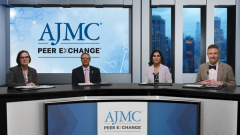
Treatment Approaches and Goals: Transplant-Eligible vs. Transplant-Ineligible Patients
Panelists discuss how treatment strategies differ between transplant-eligible and transplant-ineligible multiple myeloma patients, with transplant eligibility determined by functional status rather than age alone, and how quadruple therapy regimens are increasingly used for transplant-eligible patients to achieve deep, durable responses.
Episodes in this series
This segment explores the critical distinctions between transplant-eligible and transplant-ineligible multiple myeloma patients, featuring expert insights from clinical pharmacy and hematology specialists. The discussion emphasizes that the average age of diagnosis for plasma cell disorders is 69 years or older, making patient stratification essential for optimal treatment outcomes. Key factors determining transplant eligibility include functional status, frailty scores, comorbidities, pulmonary function, and cardiac ejection fraction, with experts noting that chronological age alone should not be the determining factor.
For transplant-eligible patients, the current standard involves quadruple therapy regimens incorporating CD38 antibodies, proteasome inhibitors, immunomodulatory drugs, and dexamethasone. The treatment approach follows a structured pathway of induction therapy, transplant, consolidation, and maintenance, with the primary goal of achieving deep, durable responses and extended progression-free survival. This comprehensive approach represents a significant advancement in multiple myeloma care and has become the preferred strategy for eligible patients.
The discussion highlights how transplant-ineligible patients require different considerations, balancing clinical efficacy with quality of life and disease control. These patients may receive dose-adjusted triplet regimens that account for their frailty status while maintaining appropriate treatment duration. The expert panel emphasizes that the goal remains getting patients to transplant whenever possible, as this approach continues to demonstrate superior outcomes in terms of response rates and progression-free survival in multiple myeloma treatment.
Newsletter
Stay ahead of policy, cost, and value—subscribe to AJMC for expert insights at the intersection of clinical care and health economics.









